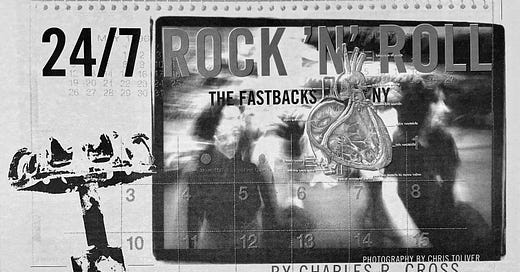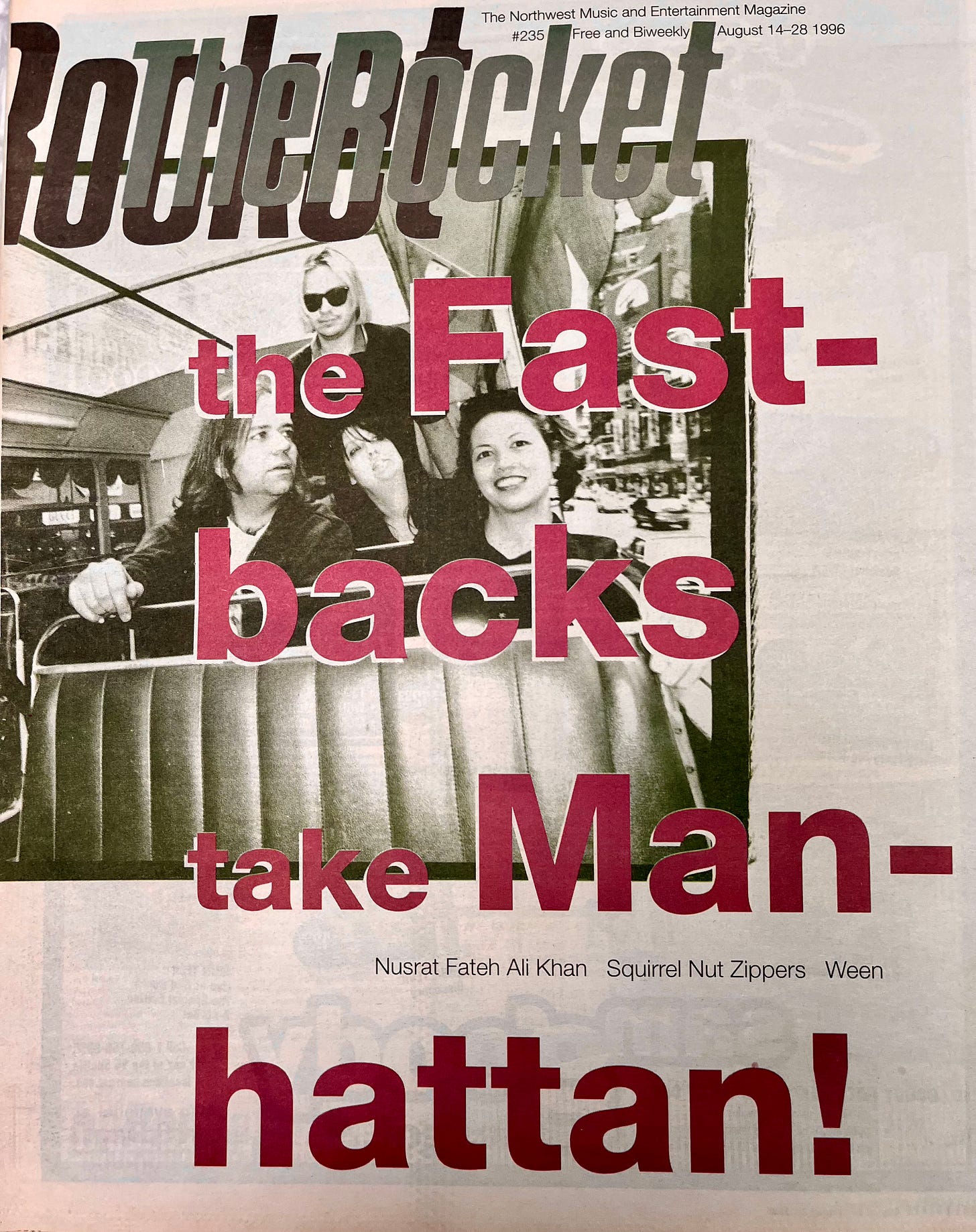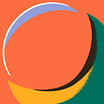Author’s 2023 note: The Fastbacks are probably the single most-beloved Seattle band of the modern era, but they sadly never found the kind of success of many of their peers. But if you talk to any of the superstars in Seattle music, from Eddie Vedder to Duff McKagan of Guns N’ Roses (who was their drummer early on), the city’s love of the Fastbacks will most certainly come up. Just last month I saw a show at Seattle’s Easy Street Records with Kurt Bloch’s new band “Bad Scene” where both Pearl Jam’s Jeff Ament and Duff got up onstage. I wrote several features on the Fastbacks over the years at The Rocket, and the first one from the early eighties was headlined “Too Loud, Too Fast,” probably an as good an epitaph as you could do if the band ever decides to end their decades long run. But this piece republished below, which was the cover story of The Rocket in August 1996, is often cited as the most complete Fastbacks story. So here it is again. —Charles R. Cross
There are no dead cats in New York City’s Times Square today. That’s a good thing because Kurt Bloch of the Fastbacks says, “There are places where you can’t swing a dead cat without hitting a Fastbacks drummer.”
At the moment Bloch and the two other Fastback stalwarts Lulu Gargiulo and Kim Warnick are standing outside the Times Square Marine Recruiting Station doing something they’ve done numerous times before: waiting for a drummer. Mike Musburger, Fastback’s drummer No. 10, is late for a photo shoot. It’s late June in New York City and it’s already too hot and muggy to wait outside for anything.
Last night at New York’s Roseland Theater you could have hit at least three Fastback drummers: Musburger; Jason Finn of The Presidents of the United States of America, who plays on one song on the latest Fastbacks album, New Mansions in Sound; and Nate Johnson, a former Fastback drummer. The Fastbacks are in New York doing a short tour with the Presidents, and Musburger is late because he plays drums for the Fastbacks and is stage manager for the Presidents. That’s part of the reason the Fastbacks got this gig, but mostly it’s because the Presidents, like most Northwest bands, are big fans of the Fastbacks. At the Roseland show, Dave Dederer of the Presidents explained that the pairing is a dream for him, too: “First we had the Young Fresh Fellows on the road with us, and now these guys. This is great!”
Even though the Fastbacks are touring with the Presidents, they aren’t exactly traveling with them, and that’s part of the reason why Musburger isn’t here yet: he’s with the Presidents in a New York City hotel.
The other Fastbacks couldn’t afford to stay in the city (and didn’t want to risk getting their gear stolen from their van), so they are staying in Secaucus, New Jersey. There’s something about these arrangements, however, that seems typically Fastbackian: Even as they play a high profile show in the biggest city in America, they are more comfortable as outsiders (and in New Jersey).
“Mike better get here soon or we’ll get Nate or Jason for the photos,” Kim jokes, without a hint of seriousness, because the band’s affection for drummer No. 10 is evident. We head to a crowded Manhattan deli—with Mexican music wafting in the background—and while we wait, the three Fastback vets begin to tell the story of the Northwest’s legendary, long-suffering band. We begin by talking about drummers even though the band says the “Fastbacks Need Drummer” story has been over-stated.
“In the past it was a big deal,” says Lulu. “Every year we were out hunting for another drummer, putting an ad in The Rocket."
“And The Rocket made that long running joke at the end of the Lip Service column,” Kurt reminds us, “saying every single issue, ‘And the Fastbacks are still looking for a drummer.’ Every month, year after year. And most of the time it was true.”
There have been enough Fastback drummers that a 20-minute conversation ensues just trying to remember who played with the band when. Finally, Kim pulls out “the book,” a 30-page, bound file that contains all the Fastbacks trivia you’d ever need. It was compiled by Seattle advertising executive and Fastback super-fan Scott Lee, who went so far as to create pie-charts breaking down what percentage of songs each drummer worked on. “Jason Finn now calls himself ‘Mr. Three Percent,’” Kim says (Musburger, by contrast, is up to 26 percent).
Other than drummers, the other big Fastback struggle has been simply staying together for 17 years. “We’ve always been outside,” says Kim. “We’re either before or after every trend. Even now we’re missing the boat because the pop/punk thing already happened. It’s almost like we want to say, ‘OK, hold on, hang on a second, we’re trying to get a record out, hold on, it’s due in three days.’ And then oops, the trend is over.’
Though “the years of struggle” are something the Fastbacks joke. just as they joke about everything, at times it seems their self-depreciation is what keeps them together. Self-depreciation is their glue. They argue that by not trying to be popular, they’ve managed to stay true to the reasons they formed a band in the first place. “Most people have the goal to be famous or rich, but our goal has always been to have fun,” says Lulu. Then Lulu tries to convince Kurt and Kim that glam metal will be the next trend and they better jump on it quickly and cash in for big bucks.
“Get the leather out now and go for the heavy metal punk,” she says to tears of laughter from Kurt and Kim.
Mike Musburger finally arrives, and the interview is suspended as a photo session begins. Though Musburger is the youngest Fastback (he first saw the band when he was in the eighth grade), he drummed with The Posies for many years. “I wanted to join the Fastbacks,” he says emphatically. “For months I bugged them.”
The roving photo shoot goes through some of the famous New York music stores and then moves to the Virgin Megastore, the largest record store in the world. After just 30 seconds in the store, the Fastbacks are close to getting arrested when store security guards get concerned about the commotion caused by photographer and band. Then Mike shows the guards their CD—on display in the punk section—and the guards mellow out.
“I saw an ad for our Roseland show,” says Kurt, “and our name was in cut-out-newspaper-style type, like The Sex Pistols. It was like we’re some kind of super punk band. Someone told me New Mansions in Sound was our most ‘pop’ record yet. And I thought, maybe we made a record that accidentally wasn’t very punk.”
Where to file the Fastbacks has always been a problem for record store employees, and it’s indicative of some of the challenges of being a Fastback. They formed in 1979 at a time when the Northwest music scene was “pitiful,” Kurt says. Kim and Lulu were 20, Kurt was 19, and they were all filled with youthful energy. And it’s still that adolescent jubilation that is at the center of their sound.
Kim’s voice sounds like something from an early Phil Spector production, and when mixed with Lulu it sounds like a whole rock and roll high school. Kurt adds the guitar and writes the weird songs. Mike provides the beat, which sometimes really is punk. “I hate adult music or music that is targeted to adults,” says Kurt (walking past a display of Celine Dion CDs). “That’s always a bad idea.” When asked to name any other Northwest band that has lasted as long as they have, the Fastbacks are quiet for the first time.
“Junior Cadillac,” says Lulu.
“They don’t count,” yells Kurt.
Kurt suggests that one of the reasons the Fastbacks have lasted so long is that they’ve cut out the unnecessary ingredients. “Sometimes I think that our band is based on what we don’t want to be as much as it’s based on what we do want to be. We try not to do the stuff that other people do that we think is stupid. And if you take out all the stuff that we think is stupid, you’re only left with five percent of the pieces. Then you have to put a few of them back that seem stupid to only one or two people.”
The photographer has left, and the band has settled into Virgil’s Bar-B-Que Pit, just off 42nd Street, to resume telling its history. Lulu comes and goes from the table, both editing a video and giving remodeling instructions by phone (her “real” job is in film production). Kim checks her pager and keeps running to the phone also (her real job is in retail sales with Sub Pop). As always with the Fastbacks, commitment ends up being one of the favorite topics. “Kurt and I got into this big discussion about a year ago about playing an all-ages show in Redmond,” says Lulu. “I just wasn't interested in going. We ended up doing it, and it was fun and all, but the point was, to me, I feel like my time is valuable. I do so many other things, like gardening.”
“Like our time isn’t very valuable?” asks Kurt.
“Like I said to Kurt, ‘If you did something other than music, you’d understand this,’” Lulu continues.
“You wouldn’t think that way if your life was 24/7 rock and roll,” Kurt says as they roll on the floor in laughter. Kurt does seem like the type that lives and breathes the Fastbacks 24 hours a day, seven days a week. But his joke reflects an intimacy among these musicians that you find only in a family where everyone knows each other’s strengths and weaknesses. There is a lot of teasing.
Lulu’s happiness (or unhappiness) is also a running theme with the band. “I remember The Rocket review of Fastbacks Play Five of Their Favorites,” says Kurt, referring to a record the band put out in the early-80s. “Scott McCaughey wrote the review, and at the bottom there was this note: ‘Lulu and Richard have left the band. If you’re interested in continuing Seattle’s coolest band, give them a call.’”
The early years also featured frequent battles between Lulu and Kurt. “Kurt and I used to spend about half the shows arguing onstage,” explains Lulu.
“People would actually leave,” says Kim. “Sometimes I would leave. It was a dangerous place. I would have to keep an eye out, so I wasn’t in the war crossfire.”
If there is a dark side to the story of the get Fastbacks, it probably came in the late-80s when Lulu was unhappy, and Kim was having substance abuse problems. “It was kind of a nosedive,” says Kurt, who himself seems happy when things with the Fastbacks are going well. “The Fastbacks were virtually non-existent. Kim was out in the pasture.”
“I wasn't even in the band,” says Lulu.
“Neither was I, really,” says Kim. “Kurt was holding the band together.”
“Nobody wanted to put out our record,” remembers Kurt. “We had no records, no shows, no interest. Nothing. I remember going to parties in late 1988 and asking people if they wanted to start a band.” At the time, Kurt did end up joining the Young Fresh Fellows but managed to continue to work with both bands.
What turned it around for the Fastbacks was a history that was too long to give up on, and continued interest in the band’s records, particularly overseas. A friend of Bloch’s had released Very, Very Powerful Motor in the U.K. and, surprisingly, it had become a big seller. The Fastbacks reformed to tour Europe, and though that tour fell through, they stayed together. After a gig at the Vogue, Sub Pop’s Jonathan Poneman asked if they wanted to release a single.
The single turned into an EP, and it helped foster a longer-term relationship with the Seattle-based label (previous Fastbacks albums had been on either their own label or PopLlama). Musburger joined in 1992 and gave some permanency to the revolving drummer slot, and at the time of 1993’s Zucker, the “new” Fastbacks were in full swing. “If we got through the first ten years, we can get through anything,” says Kurt.
At least part of the reason for the circuitous career path is because they’ve never played the major label game. “We’ve never even had a manager,” says Kim.
“We’re unmanageable,” adds Kurt.
“The problem is,” Kim continues, “we’ve been doing what we’ve been doing longer than any manager who would manage us.”
“I think that both Kurt and I are old and set in our ways, and it would be very hard for someone to guide us,” says Lulu.
“You, Lulu, set in your ways?” Mike says, and the band is again overcome with laughter.
After almost two decades together, it would be nice to say that the Fastbacks got rich and famous and were loved around the world, recognized by security guards at every mega record store. But then that wouldn’t be the story of the Fastbacks. When the Fastbacks talk about playing the Hall of Fame, they aren’t speaking of the Cleveland museum, but instead the defunct, tiny club on the Ave in Seattle’s U-District. Yet through the good times and bad, they’ve continued to put out records, including New Mansions in Sound, maybe their finest album yet. Though there have been many down times, consider that the Fastbacks (according to the Scott Lee files) have released 16 albums or EPs, 16 singles, and have had over 22 one-off tracks on compilations or collections. That’s a mammoth discography unmatched by any other modern Northwest group.
Though sales have been slowly building, what’s solid already is the band’s reputation, both with critics (Greil Marcus has always been a big fan) and with other musicians. Sean Lennon liked the band enough that after their 1994 New York gig he invited them to crash at his house (Mike says he looked in the closet and found a guitar pedal that said “John Lennon” on it). Quiz any veteran Seattle band, from Pearl Jam to Mudhoney, and they’ll list the Fastbacks as one of the bands they respect most.
That respect has led to great exposure in the past few years with the band having a central role in the documentary film Hype, and with increasingly visible shows with the likes of the Presidents and Pearl Jam. A friendship with Eddie Vedder led to the elusive singer jamming with them at a Colorado show. They were the opening act for the final three dates of Pearl Jam’s last tour, and this time around they have the highly coveted role as openers for the entire 29-date Pearl Jam world tour, which will take them to 15 different countries (hopefully they won’t be crashing in Secaucus, New Jersey either).
The Pearl Jam dates from the last tour were career highlights for the band, allowing them to play huge arenas for the first time. “I grew up going to see arena rock shows, so it was a chance for me to finally be a part of it from the other side,” says Kim.
“On the final night we were with them,” Lulu says, “ten minutes before we were supposed to go onstage, Eddie comes up and tells the stage manager, ‘I’m going to go out and play a song before these guys.’ We were the first of three bands, but Eddie Vedder comes out and does this song and introduces us. The audience was glued to us after that.”
“Yeah, they were just hoping he’d come back,” says Kim with a chuckle.
“It was like he gave us a seal of approval,” Kurt says.
“We had been afraid that people were going to chant ‘Eddie’ throughout our set,” says Mike.
“We got the Vedder Man endorsement,” says Kim.
As we walk out of Virgil’s, the Fastbacks start looking for their van to head back to New Jersey. They’ll pick up their gear and drive to Washington, D.C. for their next show.
After a few more dates, they’ll be driving back across the country to Seattle. Kim wants to stop off at the Rock and Roll Hall of Fame in Cleveland, while Lulu wants to fly home for her job. Kurt can’t imagine any other job. “Sometimes I ask myself, what are my hobbies. There are records, and guitars, and tape recorders. That’s it.”
Hobbies, jobs, and commitments are subjects the Fastbacks could discuss for another 17 years. Who is on the bus and who is not?
“The men in the band are 24/7,” says Kurt with a grin, trying to make his permanently adolescent-sounding voice come out macho. “The girls are not quite so...rock and roll.”
“I’m 21/6,” says Kim. “I don’t want to go all the way.”
“No, I think Kim is a 24/7-type of woman,” says Mike in her defense.
“Now, Lulu,” says Kurt, “she’s more like 4/5.” The band is laughing before he even gets to the punchline, no one harder than Lulu herself.
*Note: Big thanks again to journalist, author, and The Rocket editor Charles R. Cross for letting me share this stellar story here, which appears online for the first. I love The Fastbacks.






Great article, I remember when it was published during my time in Seattle. I am still a huge fan of the band and have kept in touch with them despite now living in Singapore.
I remember reading this when it came out in '96! The Rocket was the best. So cool to revisit this all these years later.